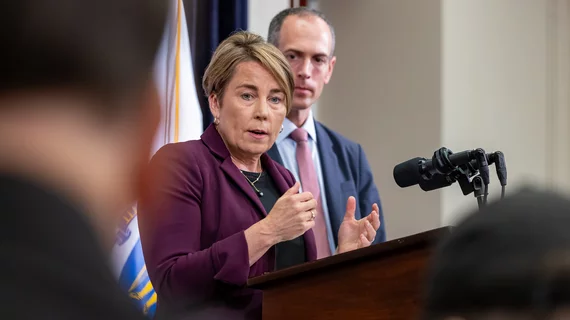Massachusetts governor signs bill to expand coverage for breast imaging services
Massachusetts Gov. Maura Healey (D) on Nov. 14 signed legislation to expand coverage for critical breast imaging services.
Under H.4918, health insurers will be required to cover additional screening options beyond mammography including breast MRI and ultrasound. Gaps in insurance policies have previously forced women with dense breast or genetic predispositions to the disease to pay for such imaging out of pocket.
“We know that early detection of breast cancer saves lives. This legislation will help ensure that cost is not a barrier for women to get the screenings and care they need,” Healey said in a statement. “I’m grateful to the legislature for their leadership on this bill, and to the patients, providers and advocates who made their voices heard in support of more affordable and accessible care for Massachusetts residents,” she added.
The state legislature previously passed the bill on Nov. 4. It was championed by Reps. James Murphy, D-Weymouth, Ruth Balser, D-Newton, and Sens. Michael Rush, D-Boston, and Joan Lovely, D-Salem. Other supporters include the Massachusetts Radiological Society, the American Cancer Society Cancer Action Network, the Susan G. Komen foundation, Massachusetts Hospitals and the Dana-Farber Cancer Institute.
About 1 in 8 women are diagnosed with breast cancer, and 71% of these cases occur in individuals with dense breasts, experts note. However, imaging technologies such as MRI are often unavailable to patients because insurance does not cover them, necessitating high out-of-pocket expenses. Gaps in coverage can result in women paying over $1,000 for a breast MRI, according to Susan G. Komen. Massachusetts joins over two dozen states that have passed similar legislation this year, among them, New Hampshire, Louisiana and Iowa.
The governor’s office is reportedly planning a ceremonial signing of the bill this week. The American Cancer Society Action Network, ASC’s nonprofit advocacy affiliate, praised the bill’s passage on Friday.
“Despite the fact that breast cancer death rates have been declining for several decades, not all people have benefited equally from the advances in prevention, early detection, and treatment that have helped achieve these lower rates. Eliminating cost barriers is a step towards addressing these inequities,” Marc Hymovitz, Massachusetts director of government relations for the ACS CAN, said in a statement. “We thank the House and Senate for passing this legislation and applaud Gov. Healey for prioritizing public health and signing H. 4918 into law.”

